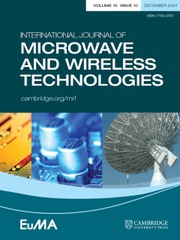Theory and experimental validation of a Class E PA above theoretical maximum frequency
Published online by Cambridge University Press: 19 June 2009
Abstract
This paper reports an investigation and a proposed solution to design Class E power amplifiers above the theoretical maximum frequency allowed by the adopted active device. Starting from the traditional time domain analysis, a numerical algorithm has been developed and presented in order to extend Class E feasibility through the optimization of the output voltage waveform. A hybrid Class E amplifier in laterally diffused metal oxide semiconductor (LDMOS) technology has been designed and measured. The final amplifier shows an output power of more than 10 W with an associated efficiency of 49% (power added efficiency (PAE) = 45%) over a 100-MHz bandwidth around 2.14 GHz.
- Type
- Original Article
- Information
- International Journal of Microwave and Wireless Technologies , Volume 1 , Special Issue 4: European Microwave Week 2008 , August 2009 , pp. 293 - 299
- Copyright
- Copyright © Cambridge University Press and the European Microwave Association 2009
References
REFERENCES
- 6
- Cited by


